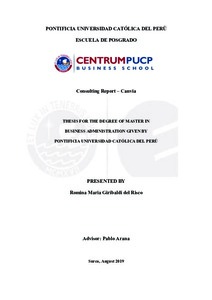| dc.contributor.advisor | Arana Barbier, Pablo José | |
| dc.contributor.author | Giribaldi del Risco, Romina Maria | |
| dc.date.accessioned | 2019-10-06T19:29:44Z | |
| dc.date.available | 2019-10-06T19:29:44Z | |
| dc.date.created | 2019-08 | |
| dc.date.issued | 2019-10-06 | |
| dc.identifier.uri | http://hdl.handle.net/20.500.12404/15113 | |
| dc.description.abstract | Canvia is a Peruvian company owned by Advent International, which is one of the
five largest private equity investment funds in the world. Canvia provides digital
transformation services to clients to achieve the concrete business results, operating the
following four business units: (a) service desk, (b) digital service, (c) business operation, and
(d) cloud. The service desk unit is currently earning a low rate of margin. The main problem
identified is a contract of service negotiated with Tiendas por Departamento Ripley, a
Chilean retail company; and Banco Ripley Peru, a Chilean bank. According to the terms of
this contract, Canvia provides their service desk services to both companies in Peru, by which
the company receives a flat fee, independently of the number of tickets Canvia team resolves.
This results in a constant revenue stream for Canvia and the increasing costs they have faced,
resulted in financial losses to the company. However, at the moment, they are generating
profits because of some changes introduced by the new Senior Manager. In this sense, the
service desk unit, in particular Ripley’s account, is interested in look for any solution that
generate a steady 20% profit margin.
After reviewing the relevant literature, we have developed three alternatives of
solutions, which are composed by several activities, which have been evaluated according to
factors such as costs, innovation, risk, value added, feasibility and Canvia’s feedback. Our
proposed solutions are a mix of these activities, which try to reduce costs but also increase
Service Desk Unit’s flat revenues. The solutions are the implementation of a training website
and the provision of training services to Ripley’s employees who manipulate embosadoras.
However, since the success of these alternatives does not depend only on Canvia, it is
concluded that the generation of a steady 20% profit margin for the Ripley account will not
be possible if Canvia does not remain contracted by Ripley to provide additional services. | es_ES |
| dc.description.abstract | Canvia es una compañía peruana parte de Advent International, uno de los cinco
fondos de inversión de capital privado más grandes del mundo. Canvia proporciona servicios
de transformación digital a sus clientes para lograr resultados comerciales concretos,
operando las siguientes cuatro unidades comerciales: (a) service desk, (b) servicio digital, (c)
operación comercial y (d) cloud. La unidad de service desk está afrontando un bajo
desempeño financiero. El principal problema identificado es el contrato de servicio negociado
con Tiendas por Departamento Ripley, una empresa minorista chilena; y Banco Ripley Peru,
un banco chileno. De acuerdo con los términos de este contrato, Canvia brinda sus servicios
de service desk a ambas compañías, a cambio de una tarifa fija que no incrementa a pesar de
que el número de tickets por resolver siga aumentando. Esto resulta en un flujo constante de
ingresos para Canvia y un aumento significativo de costos, lo cual causó que la compañía
llegue a tener pérdidas financieras. Sin embargo, actualmente están generando ganancias por
algunos cambios realizados por el nuevo Gerente de Proyecto. En este sentido, la cuenta de
Ripley en la unidad de service desk, está interesada en buscar cualquier solución que genere
un margen estable del 20%.
Después de revisar la literatura relevante, se han desarrollado tres alternativas de
soluciones, compuestas por varias actividades, que han sido evaluadas de acuerdo a ciertos
factores. La solución propuesta es una combinación de estas actividades - la implementación
de un sitio web de capacitación y la provisión de servicios de capacitación sobre embosadoras
- con el objetivo de reducir costos y también aumentar los ingresos fijos de la unidad. Sin
embargo, dado que el éxito de estas alternativas no depende solo de Canvia, se concluye que
la generación de un margen de beneficio estable del 20% para la cuenta de Ripley no será
posible si Canvia no permanece contratado por Ripley para la provisión de servicios
adicionales. | es_ES |
| dc.language.iso | eng | es_ES |
| dc.publisher | Pontificia Universidad Católica del Perú | es_ES |
| dc.rights | Atribución-NoComercial-SinDerivadas 2.5 Perú | * |
| dc.rights | info:eu-repo/semantics/openAccess | es_ES |
| dc.rights.uri | http://creativecommons.org/licenses/by-nc-nd/2.5/pe/ | * |
| dc.subject | Tecnología de la información | es_ES |
| dc.subject | Transformación digital | es_ES |
| dc.title | Consulting report – Canvia | es_ES |
| dc.type | info:eu-repo/semantics/masterThesis | es_ES |
| thesis.degree.name | Magíster en Administración de Negocios | es_ES |
| thesis.degree.level | Maestría | es_ES |
| thesis.degree.grantor | Pontificia Universidad Católica del Perú. CENTRUM | es_ES |
| thesis.degree.discipline | Administración de Negocios | es_ES |
| renati.advisor.dni | 44614140 | |
| renati.advisor.orcid | https://orcid.org/0000-0002-4449-0086 | es_ES |
| renati.author.dni | 72683566 | |
| renati.discipline | 413207 | es_ES |
| renati.level | https://purl.org/pe-repo/renati/level#maestro | es_ES |
| renati.type | https://purl.org/pe-repo/renati/type#tesis | es_ES |
| dc.publisher.country | PE | es_ES |
| dc.subject.ocde | https://purl.org/pe-repo/ocde/ford#5.02.04 | es_ES |






